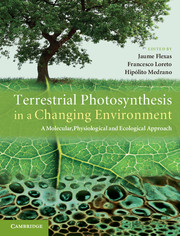 Terrestrial Photosynthesis in a Changing Environment
Terrestrial Photosynthesis in a Changing Environment Published online by Cambridge University Press: 05 March 2013
Basic characteristics of solar radiation
Among the factors affecting plants, solar radiation is perhaps the most heterogeneous in space and time. Important parts of solar radiation provide energy for photosynthesis and serve as signals in photoregulation of plant growth and development. The sun radiates energy in the spectral range from 280 to 4000 nm, with a maximum in the blue-green (480 nm; Fig. 16.1). Within the PAR, solar radiation peaks at ca. 590 nm (Fig. 16.1). Solar radiation can be segregated into direct solar radiation and diffuse sky radiation, which reaches the ground after multiple scattering on atmospheric particles and clouds, reflection from the ground surface and additional scattering in the atmosphere (Ross, 1981).
The widespread, albeit vague, term light is used for the portion of the electromagnetic spectrum in the vicinity of visible light (Kohen et al., 1995). Many past ecological and physiological studies were based on measurements that represent the stimulation of the human eye by radiant energy, a measure called illuminance and expressed in foot-candles (English system) or luxes (metric system). The human eye is most sensitive in the green spectral region, centered around 550 nm, whereas any quanta in the spectral region of 400–700 nm have enough energy to drive photosynthesis, so illuminance is obviously not well suited for plant science.
To save this book to your Kindle, first ensure no-reply@cambridge.org is added to your Approved Personal Document E-mail List under your Personal Document Settings on the Manage Your Content and Devices page of your Amazon account. Then enter the ‘name’ part of your Kindle email address below. Find out more about saving to your Kindle.
Note you can select to save to either the @free.kindle.com or @kindle.com variations. ‘@free.kindle.com’ emails are free but can only be saved to your device when it is connected to wi-fi. ‘@kindle.com’ emails can be delivered even when you are not connected to wi-fi, but note that service fees apply.
Find out more about the Kindle Personal Document Service.
To save content items to your account, please confirm that you agree to abide by our usage policies. If this is the first time you use this feature, you will be asked to authorise Cambridge Core to connect with your account. Find out more about saving content to Dropbox.
To save content items to your account, please confirm that you agree to abide by our usage policies. If this is the first time you use this feature, you will be asked to authorise Cambridge Core to connect with your account. Find out more about saving content to Google Drive.